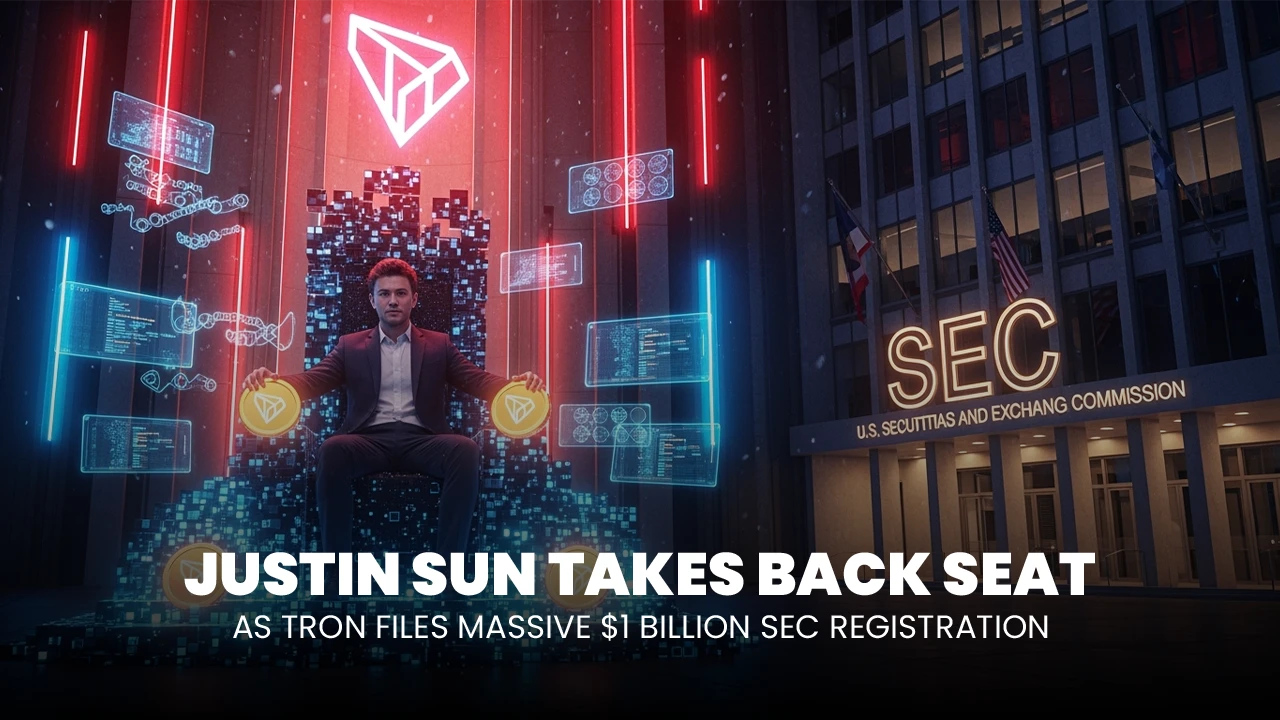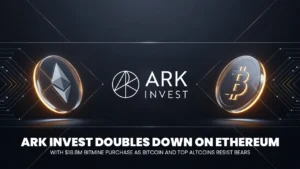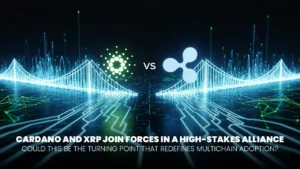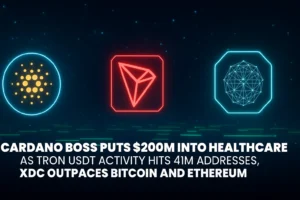Justin Sun Takes Back Seat Amid TRON’s $1B Push for SEC Registration

TRON (TRX), one of the leading blockchain networks built on the Delegated Proof of Stake (DPoS) protocol, has officially filed a $1 billion registration statement with the US Securities and Exchange Commission (SEC). This major step signals a significant shift in the project’s strategy, aligning with the announcement that founder Justin Sun will now serve in an advisory role to a newly established foundation managing the registered assets.
The Form S-1 registration was submitted on July 26, marking the first time TRON has pursued formal registration of digital assets with the SEC. This move underscores the growing emphasis on regulatory compliance across the blockchain space and puts TRON in a unique position compared to many decentralized projects that have operated outside formal US regulatory frameworks.
Justin Sun Transitions to Strategic Advisory Role
As part of the SEC registration process, Justin Sun’s role within the TRON ecosystem is being redefined. According to the registration documents, Sun is no longer directly in charge of operations or decision-making authority. Instead, he will act as a “strategic advisor” to the foundation established to oversee the offering.
ALSO READ: TRON Celebrates Nasdaq Debut, Dethrones Cardano as the 9th Largest Digital Currency
The foundation, not named in the document but closely associated with the TRON project, now holds responsibility for compliance, fundraising, and strategic direction. This separation between founding leadership and operational control appears aimed at strengthening the project’s regulatory standing and aligning with best practices for token offerings in the United States.
TRON’s unique technical structure, based on the Delegated Proof of Stake mechanism, supports this transition. With DPoS, network control is managed by a limited number of elected validators, enabling performance, scalability, and decentralization to work in harmony. The governance by validators naturally aligns with the foundation’s role, reducing the need for a centralized executive figure.
Registration Details Reveal Scope of Offering
The Form S-1 details TRX’s intent to raise up to $1 billion through the offering. It provides in-depth descriptions of the token mechanics, network structure, and the foundational role of the DPoS consensus protocol in ensuring efficient transaction processing and energy-efficient operations.
This filing places TRX among a very small group of blockchain projects that have taken the step to register their token sales with the SEC, an effort that could pave the way for broader adoption of compliant digital asset offerings in the United States.
The document also indicates that the offering’s structure has been thoroughly vetted for compliance and investor protection. With DPoS providing a scalable architecture capable of handling high transaction volumes at low cost, the filing highlights TRON’s readiness for more mainstream integration.
ALSO READ: Cardano Gets a Swipe at Apple Pay Amid TRON’s Regulatory Power Play on Nasdaq
Regulatory Compliance Signals Industry Shift
TRON’s SEC registration comes at a time when global regulators are intensifying their focus on crypto markets. The move can be seen as a proactive effort to establish legitimacy in a tightening regulatory environment. While many projects remain wary of engaging with the SEC due to legal uncertainty, TRX’s bold action reflects a belief in its model and technological framework.
The use of Delegated Proof of Stake within the TRON network was cited as a key advantage, enabling fast finality and reducing infrastructure overhead compared to proof-of-work models. By relying on 27 Super Representatives who are voted into position by token holders, DPoS allows TRON to function at enterprise-grade speed without sacrificing decentralization.
This operational efficiency makes TRX particularly suited for high-throughput applications such as decentralized finance (DeFi), content sharing, and gaming. The filing may open the door for further regulatory collaboration and expanded use of DPoS-based solutions in traditional markets.
What’s Next for TRON and the Blockchain Industry
With the SEC registration filed, the next phase for TRON will involve final approval and public engagement on the offering. The foundation will spearhead outreach and ensure that investor protections and disclosure requirements are met.
TRX’s integration of a Delegated Proof of Stake system continues to be central to its ability to meet these expectations. The DPoS protocol underpins the project’s low-latency transactions, robust validator system, and its capacity to scale with user demand.
For blockchain observers, this development sets a benchmark. As more projects seek regulatory clarity, TRON’s combination of strong technical foundations and compliance-oriented restructuring may become a model for others to follow.
ALSO READ: Steemit Woos Young Africans with Content Monetization Opportunities in 2025
Conclusion
TRON’s decision to file a $1 billion registration with the SEC is a landmark move that could reshape how blockchain projects interact with regulators. With Sun transitioning to an advisory role and the foundation stepping in to manage compliance and operations, the project is clearly aligning itself with long-term regulatory and technical sustainability. Powered by its Delegated Proof of Stake framework, TRON continues to show how performance, scalability, and decentralization can coexist in a regulated environment.
Frequently Asked Questions (FAQs)
What is the significance of TRX’s SEC registration?
It marks one of the largest formal filings by a blockchain project, aiming to raise $1 billion while ensuring regulatory compliance.
Who is overseeing the offering now?
A new foundation has taken control, with Justin Sun acting in an advisory role.
What role does DPoS play in TRX’s structure?
Delegated Proof of Stake ensures efficient, scalable, and decentralized network operations, making TRX suitable for regulated financial environments.
Is Justin Sun still leading TRX?
No, he has moved into an advisory position and no longer controls day-to-day operations.
What is a Form S-1 filing?
It’s a registration form used by companies planning to go public, detailing their financials and operational plans.
How much is TRX aiming to raise?
Up to $1 billion through the offering.
What does this mean for US crypto regulation?
It could be a turning point, encouraging more projects to register and comply with US law.
Is TRX still decentralized?
Yes, through its DPoS protocol managed by elected Super Representatives.
Why did TRX choose DPoS?
For its high-speed transaction processing, scalability, and energy efficiency.
What are Super Representatives?
They are validator nodes elected by the TRON community to maintain the network.
Glossary of Key Terms
TRON
A blockchain-based decentralized platform known for its high throughput and scalability, leveraging the Delegated Proof of Stake (DPoS) consensus mechanism.
SEC (US Securities and Exchange Commission)
A US government agency responsible for enforcing federal securities laws and regulating the securities industry, including token offerings by blockchain projects.
Form S-1
A registration document filed with the SEC by companies intending to offer securities to the public in the US It includes detailed disclosures about the company’s business, finances, risks, and plans for the offering.
Justin Sun
The founder of the TRON blockchain, now transitioning to a non-operational strategic advisory role within the newly established TRON Foundation.
TRON Foundation
An organizational entity responsible for overseeing TRON’s operations, compliance, and fundraising. It now manages the SEC-registered offering and governance structures.
Delegated Proof of Stake (DPoS)
A consensus mechanism in which a limited number of elected validators, called Super Representatives, are chosen by token holders to maintain and validate the blockchain. It enables faster transactions and lower energy usage compared to Proof of Work.
Super Representatives
Validator nodes elected by the TRON community to produce blocks, validate transactions, and maintain network security under the DPoS system.
Token Offering
A process by which blockchain projects sell digital tokens to raise funds, typically used to support development, operations, or platform usage.
Regulatory Compliance
Adhering to rules and laws established by authorities like the SEC, including disclosure requirements, investor protections, and operational transparency.
Decentralization
A structural attribute of blockchain networks where no single entity controls the system. TRON maintains decentralization through its elected validator model.
High Throughput
A measure of the number of transactions a blockchain can process in a given time frame. TRON’s DPoS system is optimized for high throughput and performance.
Public Offering
A financial event where securities (including digital tokens, in this context) are offered to public investors through a regulated and transparent process.




